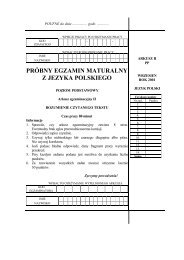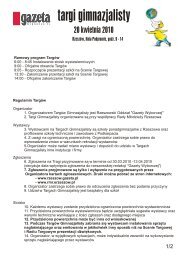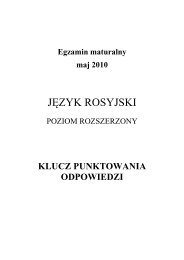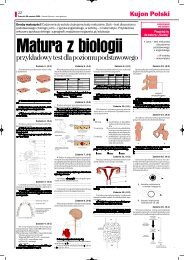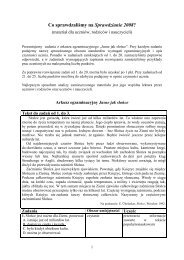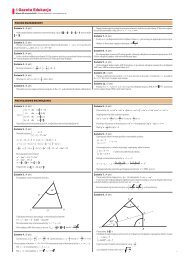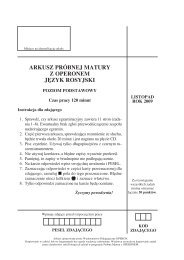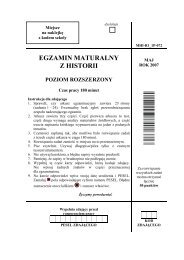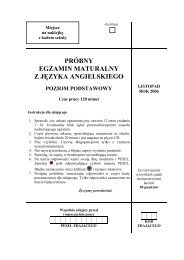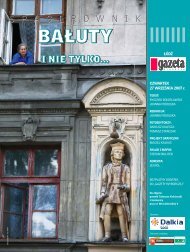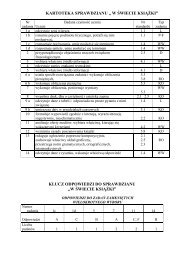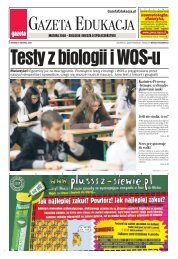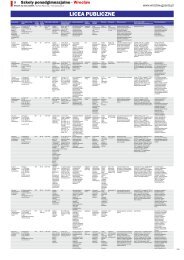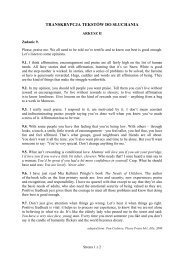EGZAMIN MATURALNY Z JĘZYKA ANGIELSKIEGO - Gazeta.pl
EGZAMIN MATURALNY Z JĘZYKA ANGIELSKIEGO - Gazeta.pl
EGZAMIN MATURALNY Z JĘZYKA ANGIELSKIEGO - Gazeta.pl
You also want an ePaper? Increase the reach of your titles
YUMPU automatically turns print PDFs into web optimized ePapers that Google loves.
Miejsce na naklejkę<br />
z kodem szkoły<br />
<strong>EGZAMIN</strong> <strong>MATURALNY</strong> Z <strong>JĘZYKA</strong> <strong>ANGIELSKIEGO</strong><br />
<strong>EGZAMIN</strong> <strong>MATURALNY</strong><br />
Z <strong>JĘZYKA</strong> <strong>ANGIELSKIEGO</strong><br />
Test I POZIOM POZIOM PODST PODSTAWOWY<br />
PODST WOWY WOWY<br />
Czas Czas pracy pracy 120 120 minut<br />
minut<br />
Instrukcja dla zdającego<br />
1. Sprawdź, czy arkusz egzaminacyjny zawiera 9 stron (zadania 1–8).<br />
Ewentualny brak zgłoś przewodniczącemu zespołu nadzorującego<br />
egzamin.<br />
2. Część pierwsza arkusza, sprawdzająca rozumienie ze słuchu, będzie trwała<br />
około 20 minut i jest nagrana na płycie CD.<br />
3. Pisz czytelnie. Używaj długopisu/pióra tylko z czarnym tuszem/atramentem.<br />
4. Nie używaj korektora, a błędne zapisy wyraźnie przekreśl.<br />
5. Pamiętaj, że zapisy w brudnopisie nie podlegają ocenie.<br />
6. Na karcie odpowiedzi wpisz swoją datę urodzenia i PESEL. Zamaluj<br />
pola odpowiadające cyfrom numeru PESEL. Błędne zaznaczenie otocz<br />
kółkiem i zaznacz właściwe*.<br />
7. Postępuj podobnie, zaznaczając odpowiedzi w części karty przeznaczonej<br />
dla zdającego. Tylko odpowiedzi zaznaczone na karcie będą oceniane.<br />
2007 2007<br />
2007<br />
Wpisuje zdający<br />
przed rozpoczęciem pracy<br />
PESEL ZDAJĄCEGO<br />
Życzymy powodzenia!<br />
Wpisuje zdający<br />
przed rozpoczęciem pracy<br />
KOD ZDAJĄCEGO<br />
Za rozwiązanie wszystkich zadań można otrzymać łącznie 50 punktów.<br />
* Pamiętajcie, że karta odpowiedzi jest dołączona tylko podczas rzeczywistego egzaminu maturalnego.<br />
dysleksja<br />
7
8<br />
<strong>EGZAMIN</strong> <strong>MATURALNY</strong> Z <strong>JĘZYKA</strong> <strong>ANGIELSKIEGO</strong><br />
ROZUMIENIE ZE SŁUCHU<br />
Zadanie 1. (6 pkt)<br />
Zapoznaj się z treścią zadania. Usłyszysz dwukrotnie wypowiedzi sześciu osób (1.1.–1.6.). Na podstawie<br />
usłyszanych informacji zdecyduj, której osoby dotyczy zdanie z zestawu zdań A.–G. Wpisz odpowiednie<br />
litery w miejsca (1.1.–1.6.). Jedno zdanie zostało podane dodatkowo i nie odnosi się do żadnej osoby.<br />
Za każdą poprawną odpowiedź otrzymasz 1 punkt.<br />
THIS PERSON<br />
A. would love to spend his holiday sailing.<br />
B. is grateful to somebody.<br />
C. needs some electronic equipment.<br />
D. has a driving licence.<br />
E. wants to buy a piece of land.<br />
F. is a keen traveller.<br />
G. dreams of moving to a new house.<br />
1.1. ....... 1.2. ....... 1.3. ....... 1.4. ....... 1.5. ....... 1.6. .......<br />
Zadanie 2. (4 pkt)<br />
Zapoznaj się z treścią zadania. Usłyszysz dwukrotnie wypowiedź na temat prowadzenia ustnej prezentacji.<br />
Na podstawie usłyszanych informacji zaznacz w tabeli znakiem X 4 rady zgodne z treścią tekstu.<br />
Za każdą poprawną odpowiedź otrzymasz 1 punkt.<br />
A.<br />
B.<br />
C.<br />
D.<br />
E.<br />
F.<br />
G.<br />
H.<br />
Be well-prepared.<br />
Entertain your audience.<br />
Know your audience.<br />
Be friendly and polite.<br />
Don't read.<br />
Zadanie 3. (5 pkt)<br />
Zapoznaj się ze zdaniami (3.1.–3.5.). Usłyszysz dwukrotnie wypowiedź na temat ciekawej wyprawy. Z podanych<br />
odpowiedzi wybierz właściwą, zgodną z treścią tekstu. Zaznacz jedną z trzech możliwości, zakreślając<br />
literę A, B lub C. Za każdą poprawną odpowiedź otrzymasz 1 punkt.<br />
3.1. The boy climbed Mount Sol-Ak in Korea<br />
A. when he was 15 years old.<br />
B. seven years ago when he was on holiday.<br />
C. when he was in elementary school.<br />
3.2. On the day of the trip they<br />
A. had to get up at 5.30. a.m.<br />
B. took an early morning train.<br />
C. travelled by two means of transport.<br />
Test est I I<br />
POZIOM POZIOM PODST PODSTAWOWY<br />
PODST WOWY <strong>EGZAMIN</strong> <strong>EGZAMIN</strong> <strong>EGZAMIN</strong> PISEMNY<br />
PISEMNY<br />
Encourage your listeners to take part.<br />
Use as many visual materials as possible.<br />
Be enthusiastic about the topic.
<strong>EGZAMIN</strong> <strong>EGZAMIN</strong> PISEMNY<br />
PISEMNY<br />
3.3. During the climb the weather was<br />
A. windy and rainy.<br />
B. bright and very warm.<br />
C. hot but cloudy.<br />
3.4. On his way to the top the boy<br />
A. was tired but didn't want to give up.<br />
B. climbed faster than his father.<br />
C. wanted to go back because he couldn't breathe.<br />
3.5. Climbing Mount Sol-Ak is important for the speaker because<br />
A. he saw how beautiful nature can be.<br />
B. it was a com<strong>pl</strong>etely new experience for him.<br />
C. his father taught him something important.<br />
<strong>EGZAMIN</strong> <strong>MATURALNY</strong> Z <strong>JĘZYKA</strong> <strong>ANGIELSKIEGO</strong><br />
Test est I I<br />
POZIOM POZIOM PODST PODSTAWOWY<br />
PODST WOWY<br />
9
10<br />
10<br />
<strong>EGZAMIN</strong> <strong>MATURALNY</strong> Z <strong>JĘZYKA</strong> <strong>ANGIELSKIEGO</strong><br />
ROZUMIENIE TEKSTU CZYTANEGO<br />
Zadanie 4. (9 pkt)<br />
Test est I I<br />
POZIOM POZIOM PODST PODSTAWOWY<br />
PODST WOWY <strong>EGZAMIN</strong> <strong>EGZAMIN</strong> <strong>EGZAMIN</strong> PISEMNY<br />
PISEMNY<br />
Przeczytaj poniższy tekst. Następnie odpowiedz na pytania (4.1.–4.9.), dopasowując miejsca (A–G) do<br />
preferencji i zainteresowań poszczególnych osób. Wpisz odpowiednie litery w rubryki tabeli. Każda litera<br />
może być użyta więcej niż jeden raz. Za każdą poprawną odpowiedź otrzymasz 1 punkt.<br />
A. Coniston Coppermines Museum<br />
High above the old village of Coniston, just a 20-minute walk away, lies the dramatic Coppermines Valley,<br />
where 500 peo<strong>pl</strong>e worked over 150 years ago. Visit our Little Heritage Museum and see our extensive<br />
collection of mining tools and equipment from the Victorian times. Park in Coniston village and walk to the<br />
copper mines.<br />
B. Dove Cottage and the Wordsworth Museum<br />
Dove Cottage was poet William Wordsworth's inspirational home. Take a guided tour and discover<br />
manuscripts, paintings and souvenirs in the award-winning Wordsworth Museum. Special events and<br />
exhibitions run throughout the year including Tuesday evening poetry readings. There is also a restaurant,<br />
bookshop and contemporary art gallery.<br />
C. The Museum of Lakeland Life<br />
The Museum of Lakeland Life in Kendal shows how our Cumbrian ancestors worked, lived and entertained<br />
themselves in the changing social climate of the past 200 years. Exhibits include a Victorian street scene,<br />
reconstructed workshops and rooms from an 18th century farmhouse.<br />
D. Conishead Priory<br />
A superb exam<strong>pl</strong>e of a Victorian Gothic mansion with extensive gardens and woodland walks to Morecambe<br />
Bay. Home to the international Buddhist Centre and unique tem<strong>pl</strong>e continuing the tradition of spiritual and<br />
healing work at the Priory since 1160. Meditation courses organised on request.<br />
E. Abbot Hall Art Gallery<br />
This elegant Georgian house in Kendal provides a superb setting for its collection of fine art. Temporary<br />
exhibitions in the small upper galleries com<strong>pl</strong>ement the permanent collection of 18th, 19th and 20th century<br />
English and Scottish art. Excellent coffee shop and bookshop selling specialist art publications.<br />
F. Carlise Castle<br />
This impressive medieval castle, where Mary Queen of Scots was once imprisoned, has a long and dramatic<br />
history. Ex<strong>pl</strong>ore passages, chambers and staircases or enjoy magnificent views of historic Carlise and beyond.<br />
Guided tours available.<br />
G. Halker Hall and Gardens<br />
Halker Hall is a superb Victorian house, home to Lord and Lady Cavendish and is very much a family home<br />
where visitors are made to feel like welcome guests. The surrounding gardens offer a richness and variety<br />
peculiar to the special microclimate of the South Lakes. The new Halker Food Hall and Gift Shop open daily.
<strong>EGZAMIN</strong> <strong>EGZAMIN</strong> PISEMNY<br />
PISEMNY<br />
4.1.<br />
4.2.<br />
4.3.<br />
4.4.<br />
4.5.<br />
4.6.<br />
4.7.<br />
4.8.<br />
4.9.<br />
<strong>EGZAMIN</strong> <strong>MATURALNY</strong> Z <strong>JĘZYKA</strong> <strong>ANGIELSKIEGO</strong><br />
Zadanie 5. (5 pkt)<br />
Przeczytaj tekst. Na podstawie informacji w nim zawartych zdecyduj, które z podanych poniżej zdań są<br />
prawdziwe (TRUE), a które fałszywe (FALSE). Zaznacz znakiem X odpowiednią rubrykę w tabeli. Za każdą<br />
poprawną odpowiedź otrzymasz 1 punkt.<br />
Lake Victoria, or Lake Nyanza as it is called by the local peo<strong>pl</strong>e, is the second largest body of freshwater in<br />
the entire world. The lake, which is located in Eastern Africa, on the border of Kenya, Tanzania, and Uganda,<br />
covers 69,484 square kilometers. For quite some time now it has attracted scientists and ecologists who have<br />
come here to study an unusual species of fish, cichlids, known for their evolutionary capabilities.<br />
Unfortunately, this wonderful lake that was once filled with some of the most beautifully coloured fresh-water<br />
species on the <strong>pl</strong>anet is now highly threatened by the activity of man. The beginning of this catastrophe came<br />
shortly after John Speke, a British ex<strong>pl</strong>orer, discovered the lake in 1858 and came up with a name to honour<br />
Queen Victoria, the monarch of the British Empire at the time.<br />
Only a few decades later ex<strong>pl</strong>oitation began. Early settlers quickly began clearing the natural vegetation in<br />
order to farm cash crops such as coffee, tea and sugar. Over the years these <strong>pl</strong>antations grew in size and<br />
numbers. The boom in agriculture soon attracted masses of migrant workers to work the fields and now an<br />
estimated 25 million peo<strong>pl</strong>e call the three surrounding countries home.<br />
Of course with any population this large there must be an infrastructure of industry to support it and<br />
a reliable food source must be found. Soon industries began dumping their waste into the once crystal-clean<br />
waters. The inhabitants turned towards cichlids, which proved to be a good source of protein-rich food<br />
easily available using sim<strong>pl</strong>e and inexpensive fishing methods. As a result, by the early 1950s, the majority<br />
of the most preferred food species had dramatically decreased in numbers and the day may come when the<br />
cichlids that we keep in our homes and public aquariums are the last exam<strong>pl</strong>es available on Earth.<br />
5.1.<br />
5.2.<br />
5.3.<br />
5.4.<br />
5.5.<br />
Which of the <strong>pl</strong>aces would be suitable for the tourist who<br />
is interested in the works of a famous artist?<br />
would like to have a cup of delicious coffee after seeing paintings of old masters?<br />
is interested in the life of Scottish monarchs?<br />
wants to learn about industry in the 19th century?<br />
would like to find out about the everyday life of previous generations?<br />
would like to learn how to relax and calm himself/herself?<br />
would like to visit a house where aristocrats live?<br />
is tired of Victorian style and likes breathtaking sights?<br />
doesn't mind easy climbing while sightseeing?<br />
Lake Victoria is not the name given by the peo<strong>pl</strong>e living in the region.<br />
John Speke's discovery commemorated the death of Queen Victoria.<br />
Ex<strong>pl</strong>oitation of the lake has continued since the late 19th century.<br />
Pollution of the lake is the only reason why the fish decreased in numbers.<br />
The text describes an extinct species of fish.<br />
Test est I I<br />
POZIOM POZIOM PODST PODSTAWOWY<br />
PODST WOWY<br />
TRUE FALSE<br />
11<br />
11
12<br />
12<br />
<strong>EGZAMIN</strong> <strong>MATURALNY</strong> Z <strong>JĘZYKA</strong> <strong>ANGIELSKIEGO</strong><br />
Zadanie 6. (6 pkt)<br />
Test est I I<br />
POZIOM POZIOM PODST PODSTAWOWY<br />
PODST WOWY <strong>EGZAMIN</strong> <strong>EGZAMIN</strong> <strong>EGZAMIN</strong> PISEMNY<br />
PISEMNY<br />
Przeczytaj tekst. W podanych poniżej zdaniach wybierz właściwe, zgodne z treścią opowiadania ich<br />
uzupełnienie. Zaznacz jedną z czterech możliwości, zakreślając literę A, B, C lub D. Za każdą poprawną<br />
odpowiedź otrzymasz 1 punkt.<br />
"I still can't believe you're making me do this, Mum." My daughter stood, hands on hips, glaring at me. "It's<br />
so uncool to go away with your parents," she went on. "No-one else does."<br />
For the sake of holiday harmony, I refrained from pointing out that Emma, her best friend, was at this very<br />
moment in a <strong>pl</strong>ane over the English Channel with her father, and that Lucy was off to Canada next week with<br />
her mother and sister.<br />
"Of course, it's quite different to go away with one parent, if they're divorced or something. That's cool,"<br />
she went on.<br />
"Well, I'm sorry that coming from a stable home with two parents who want to take you to Spain is spoiling<br />
your reputation," I answered ironically.<br />
She ran out from the kitchen, colliding with Robbie as he burst in.<br />
"Mum, I can't get these in my case," Robbie said. "Can you put them in yours?"<br />
"Robbie, you really can't take those dirty old flippers. There's no room in my case, anyway."<br />
"But I'll need them."<br />
"Well, you're not taking those things. They're going in the bin," I said.<br />
"Typical." Robbie groaned. "I don't want to go to Spain anyway..."<br />
My jaw dropped in amazement! Alan and I had been really looking forward to our family holiday. We<br />
realised that, now our children were teenagers, holidays together were soon likely to be a thing of the past.<br />
So, we'd spent hours poring over brochures, trying to find the ideal package for everyone: boutiques and<br />
night-life for Rachel, water skiing and other sea sports for Robbie to try. We'd even hired a car, despite Alan's<br />
fears of driving abroad, so we could go out sightseeing if we were unlucky with the weather. And the<br />
children didn't sound thrilled a bit about it...<br />
The sound of Alan's key in the door cut short my thoughts.<br />
"Are we all packed?" he asked hopefully. "I've had the worst day. First the computer went down, which<br />
meant none of the information I'd been working on was available, and then . . ."<br />
"Poor old you," I interrupted, trying to sound sympathetic. "We've nearly finished packing, but I think<br />
Robbie would like some help – if you're not too tired."<br />
He looked a little disappointed at the thought of having to get involved with that and sighed dee<strong>pl</strong>y.<br />
"I'll go and see him when I've had a coffee and rested a little."<br />
Biting back a comment about how I'd like time to rest when I got home from work, I just smiled and made<br />
the coffee.<br />
An hour later all the bags were packed. With the bribe of unlimited shopping in a Spanish market, Rachel<br />
was resigned to her fate of spending two weeks with the family. Also Robbie had overcome his pessimism<br />
with the assurance that, once in Spain, he could buy whatever he needed. My feeling of warm admiration<br />
for my spouse's di<strong>pl</strong>omatic skills brought back my hopes for a happy holiday, and I started feeling quite<br />
excited at the thought of clear blue skies and warm sea – not to mention the long, lazy meals that I wouldn't<br />
have to cook.<br />
Unfortunately, the feeling vanished when Alan announced that we should go to bed at 8.30 to allow<br />
enough time for a good night's sleep.<br />
"Eight-thirty!" my horrified daughter exclaimed. "I've got loads of emails to send, and my hair to do and..."<br />
"No way!" Robbie declared. "I bet you've allowed far too much time – as usual."<br />
"We don't want to be in a rush, do we? And you don't want to set off tired," Alan seemed determined to get<br />
us in bed as soon as possible.<br />
"We'll have <strong>pl</strong>enty of time to catch up on our sleep in the next fortnight, won't we, darling?" I said trying to<br />
stop further discussion. "Anyway, I expect they're too excited to sleep too long."<br />
"All right, I know when I'm beaten," he said, laughing. "But don't let me hear any of you com<strong>pl</strong>aining when<br />
the alarm goes off."
<strong>EGZAMIN</strong> <strong>EGZAMIN</strong> PISEMNY<br />
PISEMNY<br />
6.1. Rachel<br />
A. preferred to go on holiday with one parent.<br />
B. wanted to spend holiday with Lucy in Canada.<br />
C. thought Spain was not an attractive <strong>pl</strong>ace.<br />
D. did not feel like travelling with her parents.<br />
6.2. During the holiday they were not going to<br />
A. go sightseeing by coach.<br />
B. travel around on their own.<br />
C. practise any sports.<br />
D. do any shopping in local markets.<br />
6.3. Alan was disappointed because his wife wanted him to<br />
A. negotiate with the children.<br />
B. help one of the children with packing.<br />
C. prepare the coffee himself.<br />
D. pack all the suitcases.<br />
6.4. The writer felt optimistic until<br />
A. she realised she had some emails to send and her hair to do.<br />
B. Alan told them to go to sleep early.<br />
C. she thought about meals cooked by someone else.<br />
D. she discovered how little time they had left.<br />
6.5. Finally Alan agreed<br />
A. not to go to bed at all.<br />
B. to set off later than at 8.30.<br />
C. not to set the alarm clock.<br />
D. to let the children go to bed later.<br />
6.6. The idea of a family holiday seemed exciting for<br />
A. both parents and one child.<br />
B. only one of the parents.<br />
C. both of the parents.<br />
D. both of the children.<br />
<strong>EGZAMIN</strong> <strong>MATURALNY</strong> Z <strong>JĘZYKA</strong> <strong>ANGIELSKIEGO</strong><br />
Test est I I<br />
POZIOM POZIOM PODST PODSTAWOWY<br />
PODST WOWY<br />
13<br />
13
14<br />
14<br />
<strong>EGZAMIN</strong> <strong>MATURALNY</strong> Z <strong>JĘZYKA</strong> <strong>ANGIELSKIEGO</strong><br />
WYPOWIEDŹ PISEMNA<br />
Zadanie 7. (5 pkt)<br />
W czasie wakacji jesteś na obozie przetrwania. Napisz pocztówkę do swojego znajomego z Wielkiej<br />
Brytanii, w której poinformujesz o tym:<br />
• gdzie musicie spać,<br />
• jak zdobywacie pożywienie,<br />
• co sprawia Ci największą trudność,<br />
• czego nie możesz się doczekać po powrocie do „cywilizacji”.<br />
Podpisz się jako XYZ. W zadaniu nie jest określony limit słów. Oceniana jest umiejętność zwięzłego przekazu<br />
wszystkich informacji określonych w poleceniu (4 punkty) oraz poprawność językowa (1 punkt).<br />
CZYSTOPIS<br />
................................................................................................................................................<br />
................................................................................................................................................<br />
................................................................................................................................................<br />
................................................................................................................................................<br />
................................................................................................................................................<br />
................................................................................................................................................<br />
................................................................................................................................................<br />
................................................................................................................................................<br />
................................................................................................................................................<br />
................................................................................................................................................<br />
................................................................................................................................................<br />
................................................................................................................................................<br />
................................................................................................................................................<br />
................................................................................................................................................<br />
................................................................................................................................................<br />
................................................................................................................................................<br />
................................................................................................................................................<br />
Liczba<br />
punktów<br />
Inf. 1<br />
Test est I I<br />
POZIOM POZIOM PODST PODSTAWOWY<br />
PODST WOWY <strong>EGZAMIN</strong> <strong>EGZAMIN</strong> <strong>EGZAMIN</strong> PISEMNY<br />
PISEMNY<br />
TREŚĆ<br />
Inf. 2 Inf. 3 Inf. 4<br />
POPRAWNOŚĆ<br />
JĘZYKOWA<br />
0–1 0–1 0–1 0–1<br />
0–1<br />
RAZEM
<strong>EGZAMIN</strong> <strong>EGZAMIN</strong> PISEMNY<br />
PISEMNY<br />
Zadanie 8. (10 pkt)<br />
<strong>EGZAMIN</strong> <strong>MATURALNY</strong> Z <strong>JĘZYKA</strong> <strong>ANGIELSKIEGO</strong><br />
W czasie przyjęcia z okazji zakończenia kursu językowego zrobiono zdjęcia każdej grupie i wraz z opisem<br />
zamieszczono je w lokalnej prasie. Okazało się jednak, że pomylono fotografie i zamiast zdjęcia Twojej<br />
grupy zamieszczono jakieś inne, z Waszymi nazwiskami w opisie. W imieniu całej grupy napisz list do<br />
redakcji tej gazety, w którym:<br />
• opiszesz zaistniałą sytuację, wymieniając numer pisma, w którym zaszła ta pomyłka;<br />
• dokonasz ogólnego opisu grupy i stopnia zażyłości między Wami;<br />
• wytłumaczysz, dlaczego zamieszczenie Waszego zdjęcia było dla Was ważne i jakie nastroje zapanowały<br />
wśród Was po ukazaniu się pisma;<br />
• zaproponujesz sposób naprawienia powstałego błędu i termin załatwienia tej sprawy.<br />
Pamiętaj o zachowaniu odpowiedniej formy i stylu listu. Nie umieszczaj żadnych adresów. Podpisz się jako<br />
XYZ. Długość listu powinna wynosić od 120 do 150 słów. Oceniana jest umiejętność pełnego przekazania<br />
informacji (4 punkty), forma (2 punkty), poprawność językowa (2 punkty) oraz bogactwo językowe (2 punkty).<br />
CZYSTOPIS<br />
................................................................................................................................................<br />
................................................................................................................................................<br />
................................................................................................................................................<br />
................................................................................................................................................<br />
................................................................................................................................................<br />
................................................................................................................................................<br />
................................................................................................................................................<br />
................................................................................................................................................<br />
................................................................................................................................................<br />
................................................................................................................................................<br />
................................................................................................................................................<br />
................................................................................................................................................<br />
................................................................................................................................................<br />
................................................................................................................................................<br />
................................................................................................................................................<br />
................................................................................................................................................<br />
Liczba<br />
punktów<br />
Inf. 1<br />
TREŚĆ<br />
Inf. 2 Inf. 3 Inf. 4<br />
Test est I I<br />
POZIOM POZIOM PODST PODSTAWOWY<br />
PODST WOWY<br />
FORMA<br />
BOGACTWO<br />
JĘZYKOWE<br />
POPRAWNOŚĆ<br />
JĘZYKOWA<br />
0–0,5–1 0–0,5–1 0–0,5–1 0–0,5–1 0–1–2 0–1–2 0–1–2<br />
RAZEM<br />
15<br />
15
16<br />
16<br />
<strong>EGZAMIN</strong> <strong>MATURALNY</strong> Z <strong>JĘZYKA</strong> <strong>ANGIELSKIEGO</strong><br />
OCENIANIE ARKUSZA<br />
POZIOM PODSTAWOWY<br />
Test est I I<br />
POZIOM POZIOM PODST PODSTAWOWY<br />
PODST WOWY <strong>EGZAMIN</strong> <strong>EGZAMIN</strong> <strong>EGZAMIN</strong> PISEMNY<br />
PISEMNY<br />
Zadanie 1.<br />
Za każde poprawne rozwiązanie przyznajemy 1 punkt. Maksimum 6 punktów.<br />
Zad.1 A B C D<br />
1.1.<br />
1.2.<br />
1.3.<br />
1.4.<br />
1.5.<br />
1.6.<br />
X<br />
X<br />
X<br />
X<br />
E F G<br />
X<br />
Zadanie 2.<br />
Za każde poprawne rozwiązanie przyznajemy 1 punkt. Maksimum 4 punkty.<br />
Zad.2 A B C D E F G<br />
X<br />
X<br />
X X X<br />
Zadanie 3.<br />
Za każde poprawne rozwiązanie przyznajemy 1 punkt. Maksimum 5 punktów.<br />
Zad.3 A B C<br />
3.1.<br />
3.2.<br />
3.3.<br />
3.4.<br />
3.5.<br />
Zadanie 4.<br />
Za każde poprawne rozwiązanie przyznajemy 1 punkt. Maksimum 9 punktów.<br />
Zad.4 A B C D<br />
4.1.<br />
4.2.<br />
4.3.<br />
4.4.<br />
4.5.<br />
4.6.<br />
4.7.<br />
4.8.<br />
4.9.<br />
X<br />
X<br />
X<br />
X<br />
X<br />
X<br />
X<br />
X<br />
X<br />
X<br />
E F G<br />
X<br />
X<br />
X<br />
X<br />
H
<strong>EGZAMIN</strong> <strong>EGZAMIN</strong> PISEMNY<br />
PISEMNY<br />
<strong>EGZAMIN</strong> <strong>MATURALNY</strong> Z <strong>JĘZYKA</strong> <strong>ANGIELSKIEGO</strong><br />
Test est I I<br />
POZIOM POZIOM PODST PODSTAWOWY<br />
PODST WOWY<br />
Zadanie 5.<br />
Za każde poprawne rozwiązanie przyznajemy 1 punkt. Maksimum 5 punktów.<br />
Zad.5 T F<br />
5.1.<br />
5.2.<br />
5.3.<br />
5.4.<br />
5.5.<br />
X<br />
X<br />
X<br />
X<br />
X<br />
Zadanie 6.<br />
Za każde poprawne rozwiązanie przyznajemy 1 punkt. Maksimum 6 punktów.<br />
Zad.6 A B C D<br />
6.1.<br />
6.2.<br />
6.3.<br />
6.4.<br />
6.5.<br />
6.6.<br />
X<br />
X<br />
X<br />
X<br />
X<br />
X<br />
Zadanie 7. – krótka forma użytkowa. Maksimum 5 punktów.<br />
Sprawdza egzaminator zgodnie z kryteriami.<br />
Zadanie 8. – dłuższa forma użytkowa. Maksimum 10 punktów.<br />
Sprawdza egzaminator zgodnie z kryteriami.<br />
17<br />
17
18<br />
18<br />
<strong>EGZAMIN</strong> <strong>MATURALNY</strong> Z <strong>JĘZYKA</strong> <strong>ANGIELSKIEGO</strong><br />
TRANSKRYPCJA NAGRAŃ<br />
POZIOM PODSTAWOWY<br />
Zadanie 1.<br />
We asked a number of students what they would like to buy if money was not a problem. Here is what<br />
they said...<br />
1.1. Jeanie, United States<br />
One thing I really would love to buy if I had enough money is actually a new home for my mother, because<br />
she has done so much for me in life and I feel like I'd like to do something really special for her. I can't live<br />
with her, but I would like her to be as comfortable as possible.<br />
1.2. Naomi, Australia<br />
I wish I had enough money to buy a new car. Actually the car I drive around now is a 1983 Subaru wagon,<br />
which is full of rust, but it does go pretty well. It's smooth and the engine sounds nice but it's very rusty and<br />
looks awful. If I changed it, I would really impress my boyfriend...<br />
1.3. Mark, United States<br />
If money were no object, and money were not a problem, I would like to buy a boat. That's sort of my<br />
dream. One day, I will have enough money and I will buy a boat. There's something about it when I'm on the<br />
water in a boat I just feel com<strong>pl</strong>etely relaxed, yeah, and definitely, that's what I'd buy if I had the money.<br />
1.4. Simon, Canada<br />
One thing I would buy if I had enough money, or if I had won enough money to buy something, is an island,<br />
which would mean that I got a lot of money to basically to be the king of a <strong>pl</strong>ace. You know some peo<strong>pl</strong>e like<br />
to buy houses. I want to have an island.<br />
1.5. Ruth, England<br />
I'd probably choose a ticket to go around the world and enough spending money to go with it. That would<br />
be amazing! Every time I wanted something, I would just buy it and then I would go on to another <strong>pl</strong>ace.<br />
And I wouldn't have to worry about hotel prices, <strong>pl</strong>ane tickets, meals just think about the next <strong>pl</strong>ace to go to.<br />
And if I went around the world, I would bring back <strong>pl</strong>enty of souvenirs from each country I visited.<br />
1.6. Barbara, Australia<br />
Something I really wish I had enough money to buy is my own computer and possibly a printer or a scanner,<br />
because it would make doing homework much easier... At the moment I just have to go to the Internet cafe,<br />
or use the computers at school, and often they don't work.<br />
Zadanie 2.<br />
Test est I I<br />
POZIOM POZIOM PODST PODSTAWOWY<br />
PODST WOWY <strong>EGZAMIN</strong> <strong>EGZAMIN</strong> <strong>EGZAMIN</strong> PISEMNY<br />
PISEMNY<br />
Making an oral presentation<br />
When making an oral presentation in class, you must know your subject well and convince your audience that<br />
they have something to gain from listening to you. What can you do to make your presentation effective?<br />
First of all, research your subject to ensure that you know enough about the topic. Then, practice your<br />
presentation until you feel comfortable. Make sure you can present your information within the time limits<br />
you will have.<br />
Remember also to adapt your presentation to the audience's level of knowledge about the subject. Think<br />
about what they need to know, what their interests are, try to predict questions they may ask and think what<br />
your answers to these will be.<br />
Another important thing is making a good impression. Talk to your audience and look at peo<strong>pl</strong>e so that<br />
everyone feels that you are talking to them. You can of course use your notes if necessary, but looking down<br />
at a page from a book all the time is not a good idea.<br />
Try to make your presentation as clear as possible. Prepare some handouts, charts and real-life exam<strong>pl</strong>es to<br />
illustrate the problems you are presenting. But remember visual aids are sup<strong>pl</strong>ements to what you say, not<br />
re<strong>pl</strong>acements for what you say. There mustn't be too many of them and they shouldn't be so com<strong>pl</strong>ex that<br />
the audience will spend its time trying to read them instead of listening to you.
<strong>EGZAMIN</strong> <strong>EGZAMIN</strong> PISEMNY<br />
PISEMNY<br />
<strong>EGZAMIN</strong> <strong>MATURALNY</strong> Z <strong>JĘZYKA</strong> <strong>ANGIELSKIEGO</strong><br />
Test est I I<br />
POZIOM POZIOM PODST PODSTAWOWY<br />
PODST WOWY<br />
It is also a good idea to build in some sim<strong>pl</strong>e and quick activities for your listeners so that they are actively<br />
involved in your presentation. Ask questions that you are confident your audience will be able to answer,<br />
or ask them to provide exam<strong>pl</strong>es. It usually helps to break the ice.<br />
Zadanie 3.<br />
When I was an elementary school pupil, about fifteen years ago, I liked to take trips with my parents very<br />
much. One day, when I was about 7 years old, I went to Korea with my father and we decided to climb one<br />
of the highest mountains there, Mount Sol-Ak. My father was not a professional climber, he did it just for the<br />
love of it and whenever he took a trip, he would always try to take me with him. And I wanted to be just like<br />
him, naturally.<br />
In the morning we got up at 4:00 a.m. and departed at 5.30 a.m. from the Seoul station. I was very sleepy<br />
and as soon as I sat down in my seat, I fell asleep and slept until we arrived at Mt. Sol-Ak, a few hours later.<br />
When we got to the foot of the mountain we stopped for a while to prepare some cucumbers, water, and<br />
drinks for the climb. There were many peo<strong>pl</strong>e who wanted to feel the freshness of the air and see the<br />
beautiful landscapes of Mt. Sol-Ak. The weather was hot and sunny, but I could feel a little cool wind.<br />
We started to climb and at the beginning, for an hour or so, it was not difficult but then I started to feel<br />
more and more exhausted. After two or three hours I started to sweat like rain. I wanted to take a rest for just<br />
a minute, but I could not stop because father had said to me on the last trip, "You need to put up with some<br />
difficulties. If you can tolerate the pain now, you will be a better climber than me."<br />
The closer I climbed to the top of the mountain, the more difficult it was to breathe. I could not think about<br />
anything except my goal – that I would become a better climber than my father. We took a short break<br />
before we climbed the very top of the mountain. After a while I said to father "Father! Hurry up! I want to see<br />
the top."<br />
When we reached the top my clothes were totally wet but it did not matter to me. From the top of the<br />
mountain I could see the huge sun going down in the west. It looked like a gift from God. I thanked my father<br />
for helping and encouraging me. I felt so proud of myself. At the time I didn't know it was such a meaningful<br />
journey but now I realise that he taught me how to get over my problems in the future and helped me<br />
develop my self-confidence.<br />
19<br />
19
20<br />
20<br />
<strong>EGZAMIN</strong> <strong>MATURALNY</strong> Z <strong>JĘZYKA</strong> <strong>ANGIELSKIEGO</strong><br />
ROZMOWY STEROWANE<br />
Zapoznaj się z opisem trzech sytuacji. Twoim zadaniem będzie odegranie wskazanych ról.<br />
A. Uzyskiwanie, udzielanie informacji.<br />
W czasie pobytu w Anglii chcesz kupić jakieś czasopismo młodzieżowe. Rozmawiasz z ekspedientką<br />
przy stoisku z prasą.<br />
• Poinformuj, co chcesz kupić.<br />
• Po usłyszeniu kilku tytułów dowiedz się, jaka tematyka jest w nich poruszana.<br />
• Zapytaj o cenę pisma, które Cię zainteresowało.<br />
B. Relacjonowanie wydarzeń.<br />
(rozmowę rozpoczyna egzaminujący)<br />
Byłeś/-aś niedawno na ciekawej wycieczce klasowej. Opowiedz o tym znajomemu Amerykaninowi, z którym<br />
właśnie rozmawiasz przez telefon.<br />
• Opowiedz o miejscach, które odwiedziliście.<br />
• Opisz atmosferę, jaka panowała w czasie wyjazdu.<br />
• Powiedz, co nieoczekiwanego wydarzyło się pod koniec wycieczki.<br />
C. Negocjowanie.<br />
Test est I I<br />
POZIOM POZIOM PODST PODSTAWOWY<br />
PODST WOWY <strong>EGZAMIN</strong> <strong>EGZAMIN</strong> USTNY<br />
USTNY<br />
(rozmowę rozpoczyna egzaminujący)<br />
Od jakiegoś czasu źle się czujesz, ale nie masz ochoty iść do lekarza. Twój angielski współlokator próbuje<br />
Cię do tego przekonać.<br />
• Odrzuć pomysł wezwania lekarza do domu i uzasadnij swoje stanowisko.<br />
• Przyznaj rozmówcy rację co do zagrożeń wynikających z takiego postępowania i obiecaj, że o siebie<br />
zadbasz.<br />
• Wyraź zgodę na inne rozwiązanie tego problemu i podziękuj za dobre rady.<br />
(rozmowę rozpoczyna egzaminujący)
<strong>EGZAMIN</strong> <strong>EGZAMIN</strong> <strong>EGZAMIN</strong> USTNY<br />
USTNY<br />
ROZMOWA NA PODSTAWIE ILUSTRACJI<br />
Opisz poniższą ilustrację i odpowiedz na pytania egzaminującego.<br />
Pytania do ilustracji (zamieszczone wyłącznie w zestawie dla egzaminującego):<br />
1. Do you enjoy cooking? Why? Why not?<br />
2. Why is the man working in the kitchen? Justify your opinion.<br />
<strong>EGZAMIN</strong> <strong>MATURALNY</strong> Z <strong>JĘZYKA</strong> <strong>ANGIELSKIEGO</strong><br />
Test est I I<br />
POZIOM POZIOM PODST PODSTAWOWY<br />
PODST WOWY<br />
21<br />
21



